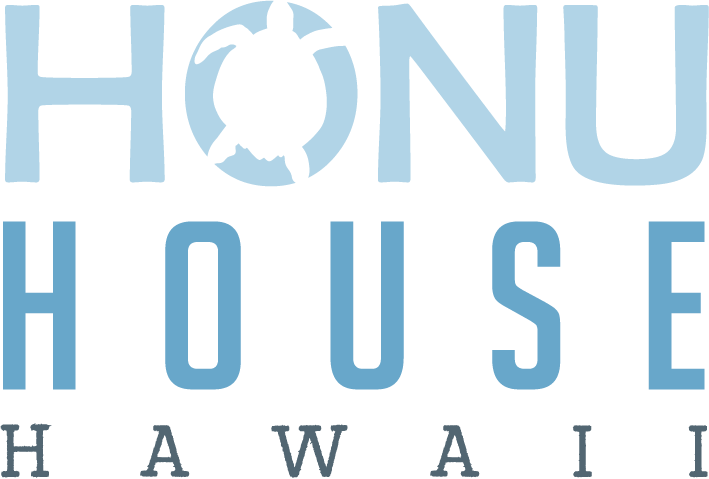
The Importance of Addiction Recovery Programs for Seniors
-
By John Burke
-
March 13, 2024
Addiction can affect anyone, regardless of age. That means seniors aren’t an exemption. According to a report by the Substance Abuse and Mental Health Services Administration, nearly one million senior citizens in the United States grappled with a substance use disorder (SUD) in 2018.
Here, we’ll explore the common causes and signs of addiction in seniors. We’ll also delve into the importance of enrolling seniors in senior rehab centers with programs tailor-made for their unique needs. Let’s dive in.
Common Causes of Addiction Among Senior Citizens
Seniors abuse drugs and alcohol for various reasons that vary from individual to individual. However, some common causes of addiction among senior citizens include:
Emotional pain: Many seniors abuse substances to cope with traumatic life events, such as the loss of loved ones. This is particularly common among seniors with weak support systems who feel isolated.
Physical pain: Aging often takes a toll on physical health, resulting in chronic pain. Many seniors abuse their prescription medications and alcohol as they provide relief from pain.
Confusion: Some seniors abuse their prescription meds unknowingly because they are unaware of the appropriate dosage. This is especially common among seniors without support from friends or caregivers.
Insomnia: Insomnia is more common among seniors than younger and middle-aged adults. According to a study published in the Sleep Medicine Clinics journal, up to 50% of older adults reported having trouble sleeping. Many of these seniors turn to prescription drugs and other substances to induce sleep.
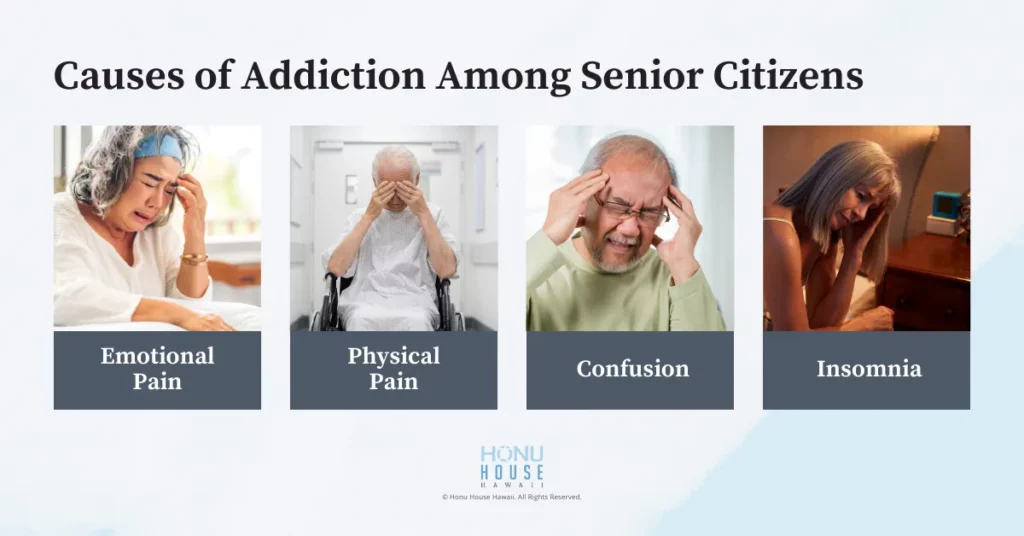
Substances Commonly Abused By Senior Citizens
While many people associate substance abuse with illicit drugs like heroin, methamphetamine, and cocaine, seniors often struggle with different culprits. The most common substances abused by seniors aren’t always illegal but rather readily available substances, which can have adverse effects if misused.
That said, here are the most commonly abused substances by seniors:
Alcohol: According to a report by the National Institute on Drug Abuse, nearly 65% of older Americans engage in high-risk drinking. Worse still, about 10% of seniors reported binge drinking. This is an issue of grave concern, particularly since many seniors take medications that can interact dangerously with alcohol.
Prescription medications: Seniors generally take more prescription meds to manage chronic health conditions like diabetes, high blood pressure, and arthritis. This makes seniors susceptible to abusing prescription drugs that are potentially addictive, like opioids and benzodiazepines.
Illicit drugs: Illicit drug abuse is more common among younger and middle-aged adults. However, some seniors abuse illegal drugs like cocaine, heroin, and meth.
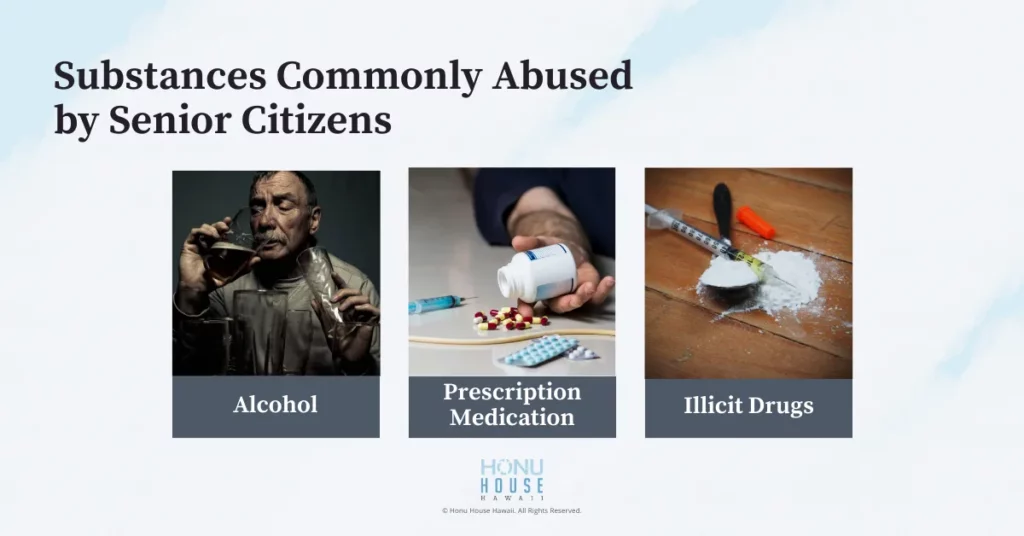
Signs of Substance Abuse in Older Adults
A rapid decline in an older adult’s physical and mental health demands immediate investigation, as it could point toward various possibilities, including substance abuse or an underlying medical condition. So, how can you tell the difference? Here are some common signs of substance abuse in seniors:
- Sudden changes in behavior such as unpredictable mood swings, increased irritability, and loss of interest in hobbies.
- Physical changes such as unexplained weight loss or gain, slurred speech, and constant fatigue.
- Mental changes such as memory loss, difficulty concentrating, and erratic sleep patterns.
- Seeking prescriptions from multiple doctors, requesting early refills and increasing dosage without the doctor’s authorization.
- Social changes such as withdrawing from family and friends, declining social invitations, and neglecting personal hygiene.
While one of these signs may not necessarily point to addiction, it’s best to err on the side of caution. Consult a doctor or an addiction specialist if you notice any of these symptoms or a combination of them. Early enrollment in a rehab center can make a huge difference in a senior’s recovery journey.
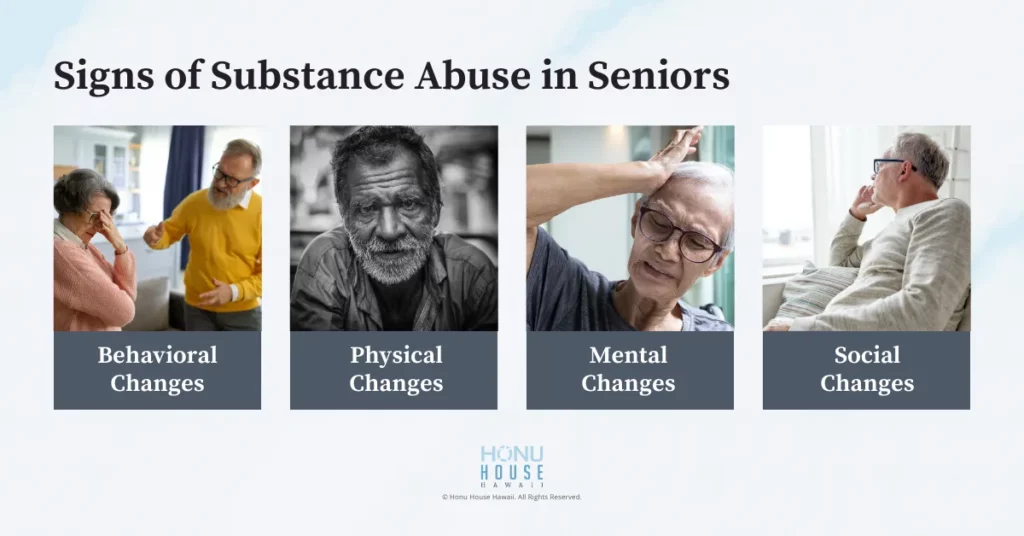
Substance Abuse Treatment Options for Seniors
When it comes to treatment options for seniors with addiction, there are several options available. Here are some of the common ones:
Outpatient Treatment
Outpatient rehabilitation centers provide flexibility, allowing older adults to remain in their homes. They usually use a variety of treatment interventions, such as individual therapy, group therapy, and alternative therapy.
Outpatient treatment programs are suitable for:
- Seniors with mild to moderate addictions
- Seniors with strong support systems
- Seniors with no mobility challenges and reliable transportation
- Seniors with low relapse risks
Inpatient Treatment
Inpatient rehabilitation or residential treatment centers provide round-the-clock care. While they offer less flexibility, residential treatment programs are better suited for seniors who require a higher level of care.
Inpatient treatment programs are ideal for:
- Seniors with severe addictions
- Seniors with weak support networks
- Seniors with mobility challenges and unreliable transportation
- Seniors with high relapse risks
Detoxification
Detox programs help stabilize individuals undergoing withdrawals from alcohol or other substances. For older adults experiencing severe withdrawal symptoms, detox is typically the preliminary step before they start other phases of the treatment process.
Continuing Care
After completing treatment, post-treatment support is essential to prevent relapse. Continuing care programs include outpatient follow-up appointments, support groups, and 12-step programs for seniors.
Benefits of Age-Specific Addiction Treatment Programs for Seniors
Seniors face unique challenges in their recovery journey. General treatment programs open to people of all ages may fail to address the unique needs and concerns of seniors. That’s where age-specific treatment programs come in.
Age-specific addiction treatment programs for older adults offer a personalized approach that maximizes the chances of successful recovery. That said, here are the benefits of rehab centers for seniors:
Understanding the Nuances of Senior Addiction
Senior addiction often involves different substances than those commonly abused by young and middle-aged adults. For instance, seniors are more susceptible to abusing prescription meds than younger adults. Age-specific treatment programs can offer a tailor-made approach to address prescription drug abuse among seniors compared to general programs.
Tailored Therapies and Activities
Age-specific addiction treatment programs for seniors offer personalized therapies and activities designed to address cognitive changes, mobility challenges, and the emotional challenges seniors face. For example, instead of physically demanding activities, sessions might emphasize mindfulness practices or art therapy to accommodate seniors.
Integrated Medical Care
Many seniors with addiction also have underlying medical conditions that require specialized attention. Age-specific programs seamlessly integrate medical care with addiction treatment, ensuring both aspects are addressed comprehensively.
This integrated approach optimizes health outcomes and prevents complications from interactions between medications and other substances.
Addressing Social Connection and Loneliness
Older adults are more likely to relate to the experiences of their peers. Since age-specific programs group individuals by age, they lead to better connections among individuals. Additionally, the strong ties age-specific programs create reduce the risk of loneliness during recovery, resulting in better outcomes.
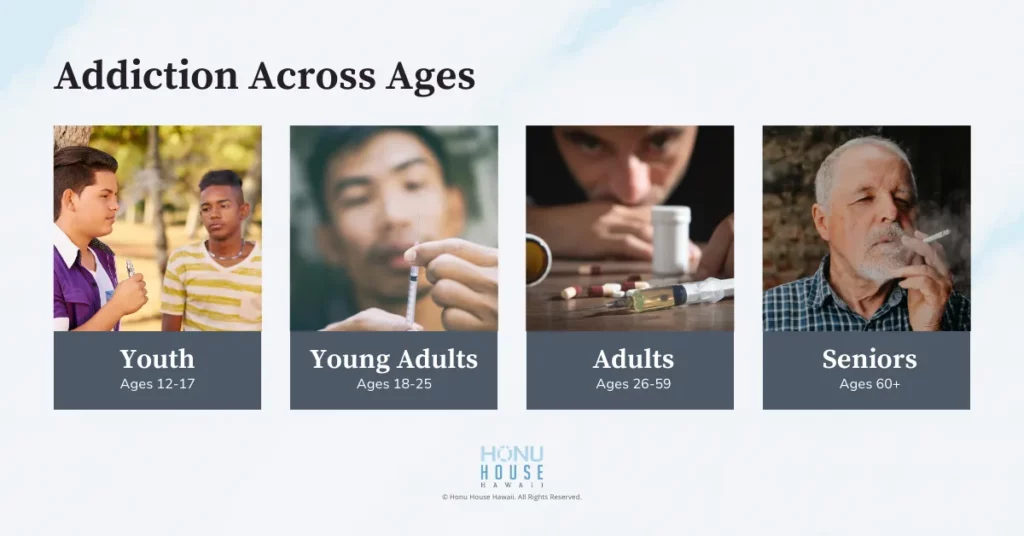
Benefits of Addiction Treatment Programs for Seniors
Besides the benefits of age-specific treatment, here are some overall pros of addiction treatment for seniors:
Improved Physical and Mental Health
Successful addiction treatment for seniors translates to significant improvements in both physical and mental health. Reduced substance abuse results in enhanced energy levels, improved sleep quality, and better management of chronic conditions. Cognitive function also improves, reducing the risk of injuries due to falls.
Additionally, older adults experience reduced anxiety and depression and improved mental well-being, leading to a higher quality of life.
Strengthened Relationships
Recovery empowers seniors to rebuild relationships with loved ones that they may have severed due to addiction. Whether it’s through having candid conversations with loved ones and asking for forgiveness or accepting social invitations to social gatherings, addiction treatment can encourage older adults to mend broken relationships.
Improved Finances
Addiction is costly, but failing to treat it is even costlier. Addiction treatment can help seniors get their finances in better shape by enabling them to stop buying expensive drugs and other substances.
Where to Find a Safe Rehab Center Near Me
Addiction doesn’t have to be a solitary struggle. If you or a loved one is a senior citizen battling with addiction and looking for rehab in Hawaii, we’re here to help.
At Honu House Hawaii, we offer personalized addiction recovery programs for seniors and provide a tranquil space for older adults who want to overcome alcohol and drug abuse. Our professional, compassionate, and skilled staff have experience working with senior citizens, so you can rest assured you or your loved one will get the care you need and deserve.
Contact us today to learn more about our addiction recovery programs for seniors or to enroll in one of our treatment programs.
FAQs
What Is an Addiction Recovery Program for Seniors?
These are tailor-made programs designed to address the unique needs and challenges seniors face with addiction. They usually offer personalized therapies, activities, and support groups tailored for seniors.
Are Seniors Affected Differently by Alcohol and Other Drugs?
Yes, seniors may be impacted differently by alcohol and other substances due to various factors. For example, existing health issues can interact with substances, leading to complications. Also, seniors may be more prone to side effects due to dependence on other medications.
What Should I Expect During a Program?
While programs vary from one rehab center to another, they generally involve assessment, individual therapy, group therapy, and alternative therapy to help older adults overcome addiction.
How Long Does Rehab Last?
The duration of rehabilitation programs varies depending on the type of program and the severity of the addiction. Some programs last a few weeks, while others take several months or even years. Ultimately, the goal of any rehab program is to help seniors overcome addiction and live a drug-free life.
How Much Does Rehab for Seniors Cost?
The rehab cost for seniors varies depending on the program type, length, location, amenities, and other factors. Some insurers may cover all or part of the cost, and finance assistance programs may be available. Get in touch with us to learn more about the costs of our treatment programs.
